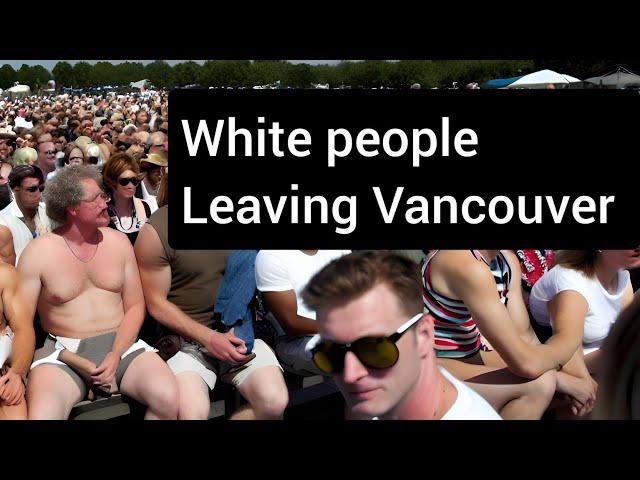
Vancouver is dying, Aboriginals and Whites Leaving Vancouver - As we sell off to Chinese Investors
Aboriginals and whites are leaving Metro Vancouver for other regions of B.C., particularly to live in the Fraser Valley, Vancouver Island and the Okanagan, according to Statistics Canada.
Article content
A net total of 9,345 whites and 460 Indigenous people left Metro for other parts of the province in the one-year period ending July, 2016, according to newly released Statistics Canada data.
Two other demographic groups that are tending to say goodbye to Metro Vancouver are those who are born in Canada and those between ages 55 and 65.
It’s been more than two decades since Metro Vancouver has experienced so many residents depart for other regions of the province, according to data provided by Patrick Charbonneau, a senior analyst at Statistics Canada.
Out-migration trends similar to Metro Vancouver have also occurred in Toronto and Montreal. In all three cities, said Charbonneau, “there were more non-visible minorities (i.e. whites) leaving those regions for elsewhere in the province than the opposite.”
While Metro Vancouver is generally losing people, to the rest of B.C., Statistics Canada reports that Victoria and Kelowna have become the only cities in Canada that are growing because of inter-provincial migration.
Meanwhile, people of colour (which StatsCan refer to as “visible minorities”), are generally not moving out of Metro Vancouver to other parts of the province. They are, however, arriving in the city in large numbers through immigration.
Several reasons are being offered for the exodus of whites, aboriginals and older people from Metro Vancouver. Some mayors say Metro Vancouver residents are seeking lower-cost housing outside the city. Others point to how retirement-age homeowners are cashing out on Metro Vancouver dwellings that have skyrocketed in price. And scholars point to demographic trends in which people of the same ethnicity often choose to live among each other.
“Across the Western world, white majorities, especially those with children, have a tendency to gravitate to neighbourhoods that are both relatively white and have limited ethnic change,” said Eric Kaufmann, a University of London, Birkbeck, professor, who was born in Hong Kong and raised in Vancouver by parents of mixed ethnicity.
“This is true in the U.S., Canada and Britain. In diverse London, England, for instance, around 600,000 more white Britons left the city than entered it in the 2000s, while 1.6 million non-white British arrived. Ethnic own-group attraction, rather than white flight or economic forces, best explains the pattern,” said Kaufmann, an often-cited specialist on global migration patterns.
Article content
Through extensive research, Kaufmann and his colleagues have found that diverse cities, like Metro Vancouver, “tend to lose white populations at a faster rate, while less diverse cities gain them, or lose whites at a slower rate.” His findings could explain one of the reasons Victoria and Kelowna, which have far less ethnic diversity than Metro Vancouver, are growing as a result of inter-provincial migration.
Figures from the 2016 Canadian census show that whites recently became a minority in the metropolises of Toronto and Metro Vancouver. The relatively small Aboriginal population of Metro Vancouver, making up about 2.5 per cent of residents, is also declining proportionally.
In the Vancouver suburb of Richmond, the ethnic Chinese population has expanded in a few decades by more than 80,000, while the white population has declined by more than 30,000.
Article content
A Postmedia series showed that Metro Vancouver is developing distinct ethnic enclaves. Ethnic Chinese now predominate in large sections of Richmond and South Asians make up three-quarters of many neighbourhoods in north Surrey. Meanwhile, whites tend to make up large majorities in suburbs such as White Rock, North Vancouver and Langley.
Despite significant inter-provincial migration trends, immigration from outside the country is changing the ethnic face of Metro Vancouver and Canada’s largest cities the most quickly.
The cities of Toronto, Montreal and Vancouver are projected to have fewer people of European origin, according to StatsCan. More than 60 per cent of all immigrants to Canada have moved to these three major cities, and more than four of five of all recent immigrants come from Asia, the Middle East, South America and Africa.
Article content
Metro Vancouver took in 142,000 new immigrants between 2011 and 2016 — and about 85 per cent of those immigrants were people of colour. Many choose to live in ethnic enclaves.
Working with political scientist Gareth Harris, Kaufmann has tracked “white withdrawal” in Britain and Canada, monitoring how whites tend to “unconsciously” avoid neighbourhoods with a large share of non-whites.
Article content
A net total of 9,345 whites and 460 Indigenous people left Metro for other parts of the province in the one-year period ending July, 2016, according to newly released Statistics Canada data.
Two other demographic groups that are tending to say goodbye to Metro Vancouver are those who are born in Canada and those between ages 55 and 65.
It’s been more than two decades since Metro Vancouver has experienced so many residents depart for other regions of the province, according to data provided by Patrick Charbonneau, a senior analyst at Statistics Canada.
Out-migration trends similar to Metro Vancouver have also occurred in Toronto and Montreal. In all three cities, said Charbonneau, “there were more non-visible minorities (i.e. whites) leaving those regions for elsewhere in the province than the opposite.”
While Metro Vancouver is generally losing people, to the rest of B.C., Statistics Canada reports that Victoria and Kelowna have become the only cities in Canada that are growing because of inter-provincial migration.
Meanwhile, people of colour (which StatsCan refer to as “visible minorities”), are generally not moving out of Metro Vancouver to other parts of the province. They are, however, arriving in the city in large numbers through immigration.
Several reasons are being offered for the exodus of whites, aboriginals and older people from Metro Vancouver. Some mayors say Metro Vancouver residents are seeking lower-cost housing outside the city. Others point to how retirement-age homeowners are cashing out on Metro Vancouver dwellings that have skyrocketed in price. And scholars point to demographic trends in which people of the same ethnicity often choose to live among each other.
“Across the Western world, white majorities, especially those with children, have a tendency to gravitate to neighbourhoods that are both relatively white and have limited ethnic change,” said Eric Kaufmann, a University of London, Birkbeck, professor, who was born in Hong Kong and raised in Vancouver by parents of mixed ethnicity.
“This is true in the U.S., Canada and Britain. In diverse London, England, for instance, around 600,000 more white Britons left the city than entered it in the 2000s, while 1.6 million non-white British arrived. Ethnic own-group attraction, rather than white flight or economic forces, best explains the pattern,” said Kaufmann, an often-cited specialist on global migration patterns.
Article content
Through extensive research, Kaufmann and his colleagues have found that diverse cities, like Metro Vancouver, “tend to lose white populations at a faster rate, while less diverse cities gain them, or lose whites at a slower rate.” His findings could explain one of the reasons Victoria and Kelowna, which have far less ethnic diversity than Metro Vancouver, are growing as a result of inter-provincial migration.
Figures from the 2016 Canadian census show that whites recently became a minority in the metropolises of Toronto and Metro Vancouver. The relatively small Aboriginal population of Metro Vancouver, making up about 2.5 per cent of residents, is also declining proportionally.
In the Vancouver suburb of Richmond, the ethnic Chinese population has expanded in a few decades by more than 80,000, while the white population has declined by more than 30,000.
Article content
A Postmedia series showed that Metro Vancouver is developing distinct ethnic enclaves. Ethnic Chinese now predominate in large sections of Richmond and South Asians make up three-quarters of many neighbourhoods in north Surrey. Meanwhile, whites tend to make up large majorities in suburbs such as White Rock, North Vancouver and Langley.
Despite significant inter-provincial migration trends, immigration from outside the country is changing the ethnic face of Metro Vancouver and Canada’s largest cities the most quickly.
The cities of Toronto, Montreal and Vancouver are projected to have fewer people of European origin, according to StatsCan. More than 60 per cent of all immigrants to Canada have moved to these three major cities, and more than four of five of all recent immigrants come from Asia, the Middle East, South America and Africa.
Article content
Metro Vancouver took in 142,000 new immigrants between 2011 and 2016 — and about 85 per cent of those immigrants were people of colour. Many choose to live in ethnic enclaves.
Working with political scientist Gareth Harris, Kaufmann has tracked “white withdrawal” in Britain and Canada, monitoring how whites tend to “unconsciously” avoid neighbourhoods with a large share of non-whites.
Тэги:
#mike_martins #housing_bubble #chinese_investors #vancouver_is_dying #sell_off_to_Chinese_Investors #Aboriginals_and_Whites_Leaving_Vancouver #mass_exodus #leaving_vancouver #exodus_of_whites #aboriginals_and_older_people_from_Metro_Vancouver #Victoria_and_Kelowna_have_become_the_only_cities_in_Canada #particularly_to_live_in_the_Fraser_Valley #Vancouver_Island_and_the_Okanagan #according_to_Statistics_Canada #housing_crash #why_i_left_vancouver #chinese_peopleКомментарии:
#katıl #yemektarifleri #pratiktarifler #fatmailehertelden #çigköfte
FATMA İLE HERTELDEN
UNDERDOG (feat. WORTHIKIDS)
Louie Zong
Michael Joins the Circus as Turbo Man | Knight Rider
Knight Rider Official


























